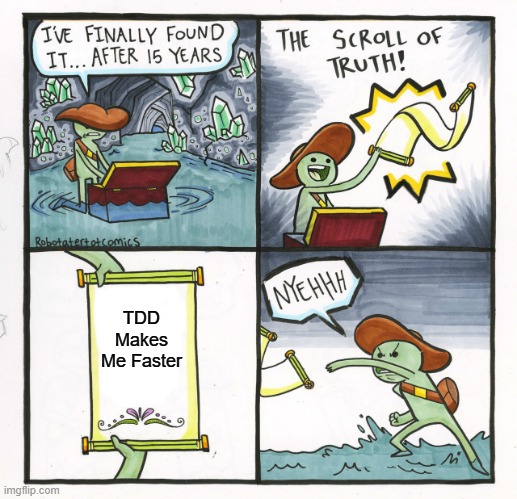Works great when you know what your doing before you start. That never actually happens in real life though.
And often if you box yourself into an API before you start implementing, it comes out worse.
I always learn a lot about the problem space once I start coding, and use that knowledge to refine the API of my system as I work.
With my stakeholders TDD is nearly impossible. I mean it’s possible, but doesn’t make sense as they shuffle their specifications every other day. I implement, they decide they wanted something different, I refactor, they don’t like it, I refactor, they accept, I write tests.
Please send help
Send help? We’re all caught in the same fire.
OOP is another case of nice in theory.
The dev who don’t know how to TDD their poorly designed object oriented spaghetti code are downvoting you, lol. Wear that with pride, but be sure to charge extra when it’s time to fix their shit.
I actually love using TDD in my real life development job…
Years of experience speaking:
- Make it work
- Make it right
- Make it fast
If your end results are following this pattern, no one gives a fuck how you do
Make it maintainable should be up there too.
I’ve worked with projects that does the right thing, but no one can add new features to it because it’s a nightmare to work with. It’s at the level of not being able to move a button on the UI without breaking how the software interacts with the cloud.
Pick two.
Nah, do all three. That should have been a numbered list.
It’s criminally underutilized. Of course, one reason is that it’s hard to TDD a moving target. Since it’s also hard to get people to actually fucking specify things in a lot of real world cases, it’s just one more thing you ought to do, but aren’t allowed to.
I think you have a point with the moving target, but also I believe that development should pretty much always be a moving target. You should be refactoring your domain based on new experiences and new knowledge all the time. So, personally, I find integration tests much more useful, because they test the input and output of a system, rather than how it’s implemented. I can change my domain without having to modify my tests and that makes changes to the domain much simpler.
That being said, I also definitely recognize the advantages of TDD, I just don’t think it’s a silver bullet; there’s good projects for it and bad ones
I like TDD in theory and I spent so many years trying to get it perfect. I remember going to a conference where someone was teaching TDD while writing tic tac toe. Unsurprisingly, he didn’t finish in time.
The thing that I hate is people conflating TDD with testing or unit testing. They’re vastly different things. Also, I hate mocks. I spent so long learning all the test doubles to pass interviews: what’s the difference between a spy, fake, stub, mock, etc. Also doing it with dependency injection and all that. I much prefer having an in-memory database than mock what a database does. Last company I worked at, I saw people write tests for what would happen if the API returned a 404 and they wrote code that would handle it and all that. In practice, our HTTP library would throw an exception not return with a statusCode of 404. Kinda funny.
You obviously can’t always get replacements for things and you’ll need to mock and I get that. I just prefer to not use them if I can.
Also, TDD advocates love saying, you’re just not doing it well or you just don’t know enough.
I get it, you love TDD and it works for you and more power to you.
I definitely believe in testing and having resilient tests that will minimize changes upon refactoring, but TDD doesn’t work for me for most of the work I do. It works for some and I love it when it does, but yeah … sorry random long ramble.
After many failed attempts at TDD, I realized/settled on test driven design, which is as simple as making sure what you’re writing can be tested. I don’t see writing the test first as a must, only good to have, but testable code is definitely a must.
This approach is so much easier and useful in real situations, which is anything more complicated than foo/bar. Most of the time, just asking an engineer how they plan to test it will make all the difference. I don’t have to enforce my preference on anyone. I’m not restricting the team. I’m not creating a knowledge vacuum where only the seniors know how yo code and the juniors feel like they know nothing.
Just think how you plan to test it, anyone can do that.
TDD is actually helpful once you get the hang of it.
It is a lifesaver in some cases
Yep :100:

How would you know what you’re going to need or what it can do before you code it ?
I don’t know if you’re joking or not. I suppose tdd will help know what you need before you start.
It’s definitely great in theory until you inherit a codebase with no tests, poor documentation, and numerous reported bugs already live in production. Even better if it was written by people hired because they could do other things better than they could code - which looking at some of the unlabeled wiring messes we were left, isn’t saying a lot.
Good way to figure out how an unknown code base works is to add unit tests tho
It’s also the only way to migrate architecture safely.






